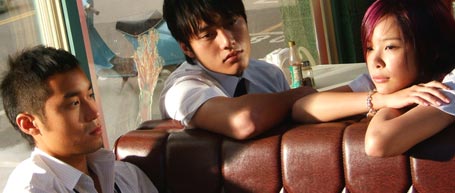In Mandarin with English subtitles.
Taiwan's given us a number of gay films over the years - Lee Ang's iconic The Wedding Banquet (1993), Yee Chin-Yen's summery Blue Gate Crossing (2002), and Chen Yin-jung's deliciously fluffy Formula 17 (2004) come immediately to mind, not to mention the television series Crystal Boys (2003).

Middle pic: Bryant Chang, Kate Yeung and Joseph Chang (from left to right)
The plot's fairly conventional - Jonathan Kang (Bryant Chang), our protagonist, is a model student who is assigned by a teacher to befriend the troublemaker Shane Yu (Joseph Chang), hopefully acting as a positive influence on him. Naturally, as the boys grow towards adolescence and Shane becomes a hunky basketball player, Jonathan begins to want to be more than friends. Throw in Carrie Tu (Kate Yeung) as the Hong Kong fag hag who's attracted to both of them, and you've got a classic queer love triangle going on.
And yet from the film's first image, we can tell that this is more than just another gay movie. We open with a wide-angle shot of the three friends, dirty and disheveled in a dingy school corridor - and it's right here, right away, that Chen introduces his aesthetic of blending the ugly, gritty landscapes of contemporary Taiwan with the sheer beauty of his actors. The camera adores their faces, lingering on them with close-ups to a level rarely seen since the days of the silent screen, and blends them with colours and compositions that complement their sculpted features.
Chen allows the story of the friends to unfold at its own pace, without melodrama or camp - almost without words, in fact. It's in a silent moment that we experience the moment of Jonathan's first inklings of sexual confusion, and thereafter it's his silences that count more than his words as he struggles with his love, tortured by his inability to voice his feelings, turning against Shane to prevent himself from speaking the truth ruining their friendship.
Eventually, we come to realise that all three characters - the sullen Jonathan, the gregarious Shane and the subdued Carrie - are all slaves to their own loneliness, too dumb to reach out and pluck happiness for themselves although it grows so close. It's not being gay that ruins Jonathan; it's his not daring to admit his love, and the universal angst of urban youth - although [spoiler alert!] he does eventually get to fuck Shane, in a scene that's extremely pleasant to watch. There's nothing vulgar about the eroticism of this movie, really - even reaction shots are placed so intimately close to the lens, you can practically smell the salt on the actors' skin.
One of the most compelling aspects of Eternal Summer might in fact be the familiarity of its setting for local audiences. The Taiwanese schools, bleak institutions of uniforms, corporal punishment and examination pressures, but alive with the headiness of youth, should be familiar to almost any Asian viewer; much more so than the fluorescent drama of the American high school in Hollywood gay films. Likewise, the apartments of damp brick and peeling plaster, the twisty streets criss-crossed with telephone wires and the smoky discos, could all be found in China, Malaysia, Indonesia or the Philippines. It's these settings that Chen captures in patterns of gloriously ingrown disorder, making this film not only one of the most heartbreaking, but also one of the most beautiful of Taiwan's gay films.
This sweeping tale of loneliness and growing up has been praised by viewers gay and straight alike, most tellingly at the Golden Horse Awards, where it garnered four nominations, including one for Jeffrey Cheung's subtly haunting score. The scrumptious Bryant Chang ultimately nabbed the Best New Performer award, proving that it can pay to act gay on screen in Chinese cinema. Try and catch this one on the big screen if you can - grab a friend or better yet, a lover, hold his or her hand, and be glad you're not alone.

